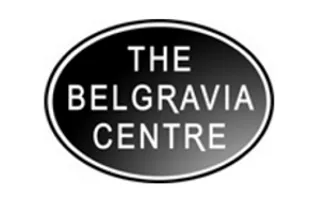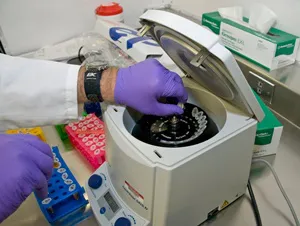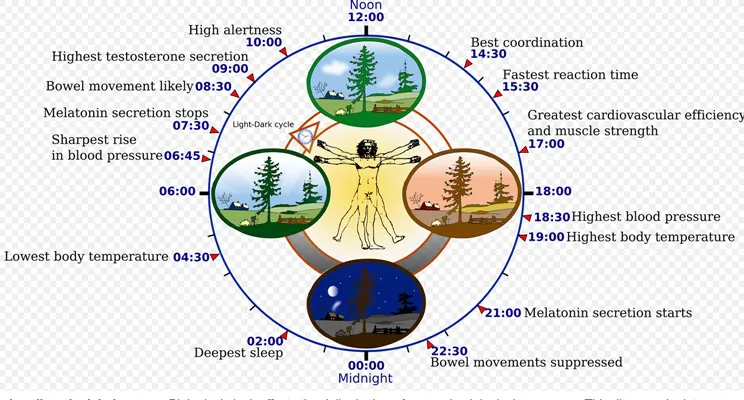
Are PRP Treatments Real Or A Hair Loss Scam?
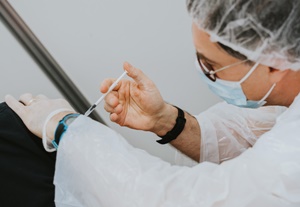 Are PRP Treatments Real Or A Hair Loss Scam?
Are PRP Treatments Real Or A Hair Loss Scam?Platelet Rich Plasma, known as PRP, is highly touted by hair loss and restoration experts as being one of the most legitimate forms of hair loss treatments currently available.
According to esteemed hair restoration expert Dr. Paul Rose, "PRP means many things to many people."Dr. Rose explains on YouTube that what PRP should really mean is "platelets that are enriched and concentrated from the person's own blood."
It's your own blood centrifuged down with the plasma separated out. Then the plasma is injected into the scalp. There are different methods of performing PRP injections. Ultimately the concentrated platelets are injected into the scalp. Platelets contain a myriad of growth factors.
PRP, when it is performed properly, has been known to stimulate hair growth to some of the hair that is already there but has stopped growing. It may not work at all for people who are bald.
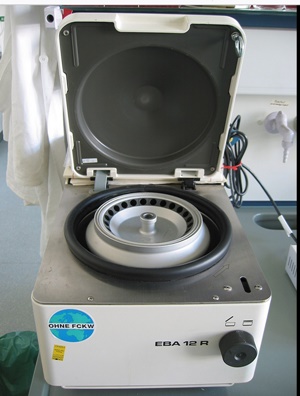 Are PRP Treatments Real Or A Hair Loss Scam?
Are PRP Treatments Real Or A Hair Loss Scam?PRP Treatments May Or May Not Be Scams
PRP treatments, which involve drawing, mixing, and then reinjecting a patient's own blood, are considered highly beneficial.
In essence, PRP utilizes the power of the patient's own blood to help regrow healthy hair.
Spencer Kobren, founder of The American Hair Loss Association (AHLA) and a highly respected hair loss consumer advocate for the past 25+ years, said on his Bald Truth podcast:
"I do believe in PRP treatment or therapy for hair loss."Kobren, who is proactive in warning hair loss patients of potential scams, warns that "not all PRP is treated equal."
This is where the potential danger of scams exists.
Misleading, Disinformation, And Confusion
One possible reason that PRP may not be equally beneficial is that the methods used for PRP treatments are all over the place, thus impacting success rates significantly.
Doctors who are totally inexperienced with hair loss treatments may start injecting PRP into patient scalps without any extensive training.
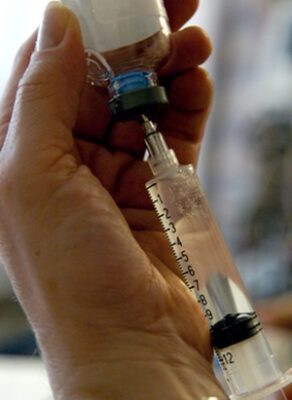 Are PRP Treatments Real Or A Hair Loss Scam?
Are PRP Treatments Real Or A Hair Loss Scam?Hair loss treatments, along with surgical hair reconstruction, have become a billion-dollar business.
Part of the problems in the hair loss industry in current times is the flood of disinformation and oversimplification of hair loss treatment requirements, procedures, benefits, and costs.
Unfortunately, there are unscrupulous players in the industry that are only concerned with their bottom lines. Making money is their only goal.
They are less concerned about the value of treatments that may be provided to educated consumers hoping for hair loss solutions.
Right Concentrations With Proper Injections Are Key
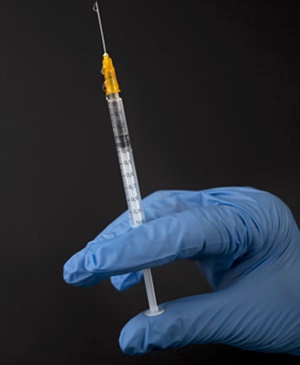 Are PRP Treatments Real Or A Hair Loss Scam?
Are PRP Treatments Real Or A Hair Loss Scam?Dr. Rose, who started doing PRP treatments for hair loss in 2015, noted, "if you get the right concentration and inject it properly, you can get a pretty good response."
But it's a temporary response. You have to keep up with PRP injection treatments. Unfortunately, no one knows the absolute proper number of injections.
When he first started with PRP, Dr. Rose didn't know for sure what were the best platelet concentrations. Concerned that he didn't know what he was injecting, he sent blood out to labs to be tested. Dr. Rose has always been committed to finding the best results for his hair loss patients.
Dr. Rose also tested many different PRP systems. He explained that he was surprised to find that the different PRP systems varied widely with the results they created. Specifically in the varying concentration rates of platelets the different PRP systems produced.
Variable Results From Different Systems
Dr. Rose believed that the reason some hair restoration professionals were reporting great PRP results while others weren't was related to the PRP systems and centrifuge machines they used.
As of current times, PRP treatment experts still aren't all on the same page. There may be different PRP systems being used, and the concentration of platelets separated from the blood might be variable.
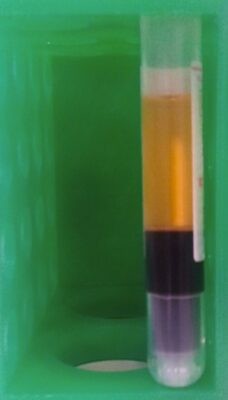 Human blood fractioned by centrifugation: Plasma (upper, yellow layer), buffy coat (middle, thin white layer), and erythrocyte layer (bottom, red layer) can be seen. Zuzanna K. Filutowska - Own work - Wikipedia
Human blood fractioned by centrifugation: Plasma (upper, yellow layer), buffy coat (middle, thin white layer), and erythrocyte layer (bottom, red layer) can be seen. Zuzanna K. Filutowska - Own work - WikipediaMany practitioners may use the least expensive PRP kits and centrifuge machines.
They also may be lax when measuring platelet counts. The injection process into the patient might also be variable from person to person.
While it's hard to point fingers and place blame on restoration experts, it's true that some professionals have much less training and long time expertise from lots of PRP experience.
It's Important To Measure Platelet Counts
Women suffering from hair loss are generally better PRP candidates. In many cases, women make better PRP candidates because they don't necessarily have good donor hair for restoration surgery.
PRP side effects are minimal. In some cases, it may cause a feeling of warmth and possible puritis or edema. Overall, PRP is very safe. Infection is extremely rare.
How often should PRP be performed, and for how long? This is another PRP variable that must be evaluated when selecting a highly skilled physician.
Most highly reputable hair restoration experts follow a PRP initiation phase.
Dr. Rose suggests waiting a month in between initial PRP treatments. After the first set of 2-3 PRP treatments, it's recommended that a few months be allowed to lapse before additional injections to measure the success of the treatments.
If there's no response after two treatments, it's unlikely Dr. Rose will continue injections. That may or may not be the case with other PRP treatment practitioners.
Platelet Counts And Ranges
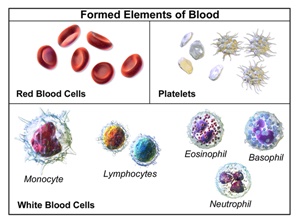 Medical gallery of Blausen Medical 2014" - Wikipedia
Medical gallery of Blausen Medical 2014" - WikipediaNormal platelet count in a healthy person ranges between 150000 and 350000 cells/μL of blood.
Platelets, as a main component of the PRP, contain more than 1100 different proteins. Numerous post-translational modifications may result in over 1500 protein-based bioactive factors.
These bioactive factors include:
- immune system messengers
- growth factors, enzymes
- their inhibitors
- other factors which can participate in tissue repair and wound healing.
 Are PRP Treatments Real Or A Hair Loss Scam?
Are PRP Treatments Real Or A Hair Loss Scam?Another important characteristic of PRP is that represents an autologous product. This means the treatment is prepared from the patient`s own blood.
The use of autologous PRP eliminates any concerns about the risk of:
- crossed contamination
- disease transmission
- immune reactions
Combining PRP With Supportive Treatment For Maximum Benefits
Some hair restoration physicians often combine PRP treatments with one or more of:
ACell - Acell MatriStem UBM™ is often referred to as “porcine urinary bladder matrix.” It's derived from pig bladder cells. It has proven to be helpful in wound healing. It may or may not be helpful for PRP injections for hair loss.
Exosomes - Exosome therapy can be administered through intravenous (IV) therapy or direct injection in the treatment area.
Exosomes are powerful elements that can restore cells throughout your body. They enhance cell-to-cell communication, which is essential for overall cell health.Microneedling - Microneedling may also be a method of treatment for hair loss. There’s even evidence that it can help with several types of hair loss. This includes alopecia areata. Microneedling is also considered a very beneficial adjunct PRP treatment.
Low level laser therapy (LLLT) - Low-level laser therapy (LLLT) or photobiomodulation (PBM) is another benefit form of hair loss treatment. It applies low-level (low-power) lasers or light-emitting diodes (LEDs) to the surface of the scalp.
Pre-PRP Scalp Peels - Some restoration experts will use specialized scalp peels or similar treatments. These treatments clear the scalp of oil, dirt, toxins, or other surface clogging materials. They may render the PRP more effective.
Some restoration physicians are also experimenting with Jet Peel treatments which offer a form of needless PRP treatments. Needle free PRP treatments may or may not be as effective as treatments with needles.
Not All PRP Is Created Equally
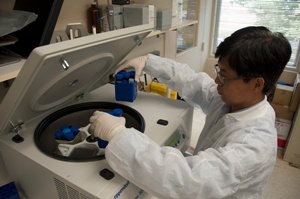 Are PRP Treatments Real Or A Hair Loss Scam?
Are PRP Treatments Real Or A Hair Loss Scam?Many people advertise the use of Platelet Rich Plasma (PRP). Unfortunately, they may take a series of shortcuts. They greatly minimize the true beneficial nature of PRP treatments.
While PRP for hair loss can work very well, in most cases, patients need to do their research and due diligence to make sure they are getting the best PRP treatments possible to avoid being misled.
Not All PRP Is Created Equal
What is the real story on PRP, and how do you know you are getting legitimate treatments? Are you getting proper or faux treatments?
It's troubling that a lot of PRP treatments being promoted in the hair loss world may not be as beneficial as they can possibly be or is borderline worthless.
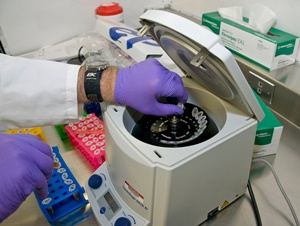 Does PRP Help With Female Hair Loss?
Does PRP Help With Female Hair Loss?This is true even in the mainstream dermatology and cosmetic surgery space. Dr. Rose has exposed the realities of PRP in the current aesthetic space.
IAHRS Founding Member Paul T. Rose, MD,has been proactive about sharing his own PRP research.
Many Different Types Of PRP Systems Exist
PRP has become a treatment epidemic. It is being used in everything from orthopedics to cosmetic surgery to hair restoration. It's an epidemic.
Many different types of PRP systems and centrifuges exist in today's hair loss world.
The many PRP studies being performed may not be comparing the same PRP systems.
 Does PRP Help With Female Hair Loss?
Does PRP Help With Female Hair Loss?There are even drive-up PRP delivery services. From one institution to another, PRP varies greatly.
Even one system to another varies greatly. Concerned about the lack of PRP industry consistency Paul T Rose, MD, did a small study himself.
Are Platelets Concentrated To Any Significant Degree?
Patients requesting PRP may not have any clue of what they are actually getting with their PRP treatments.
Some of the platelet-rich plasma systems did not concentrate the platelets to any significant degree, which meant minimal if any, benefits to the patient.
Does the hair restoration experts of their clinician take the time to measure the platelet concentrations before injecting the treatments into the patient? Does the patient understand the true concentration of the platelets?
Indeed, there are many other factors to consider when preparing platelet injections.
No PRP Protocols Exist Across The Industry
Some hair restoration experts test the platelets the minute the initial blood is drawn.
In fact, they test the patient even before they draw the blood.
They track the patient's platelet concentration. Restoration experts can provide exact platelet and concentration counts.
In addition, the restoration expert can tell the patient how many red blood cells they have.
Summary - Are PRP Treatments Real Or A Hair Loss Scam?
One of the biggest challenges in the hair loss industry in current times if the flood of misinformation that is bombarding hair loss consumers.
Unless a hair loss patient is willing to do their research, they may be enticed to receive PRP hair loss restoration treatments by less than scrupulous practitioners.
Average hair loss patients are not aware of the many PRP variations that exist in the industry.
Search for the very best hair restoration professionals with stellar reputations. Read reviews and ask for case studies.
In all fairness, it may not be intentional. Even still, do your homework and make sure you find the best hair restoration practioner possible.
Best wishes to all.Social Media Network Information
Please follow us on Twitter at: https://Twitter.com/HairBoutique. I look forward to meeting new people from all walks of Twitter and learning from their Tweets.



